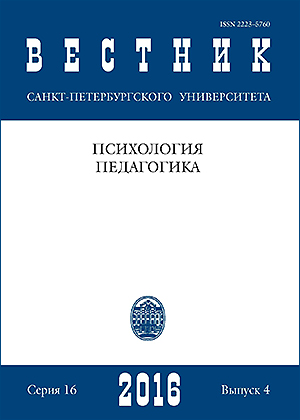Implicit Learning in Dyadic Interaction
DOI:
https://doi.org/10.21638/11701/spbu16.2016.406Abstract
Th e study examined the eff ect of dyadic interaction on the use of implicit knowledge in a perceptual categorization task. In the fi rst phase, participants memorized images of the target category. In the sec-ond and the third phases they categorized new stimuli. In the dyadic condition the second phase was held in a pair, and the third phase individually. In the individual condition participants completed all three phases on their own. Implicit knowledge was observed in both groups, but its stability was higher aft er work in pairs. Awareness of the implicit rule in both conditions was low, however participants of the dyadic condition mentioned less irrelevant characteristics of stimuli in the postexperimental questionnaire. Th e results indicate that dyadic interaction promotes the use of implicit knowledge.
Keywords:
implicit learning, perceptual categorization, verbal overshadowing, dyadic interaction, group judgments, social verification
Downloads
References
References
Downloads
Published
How to Cite
Issue
Section
License
Articles of "Vestnik of Saint Petersburg University. Psychology" are open access distributed under the terms of the License Agreement with Saint Petersburg State University, which permits to the authors unrestricted distribution and self-archiving free of charge.




